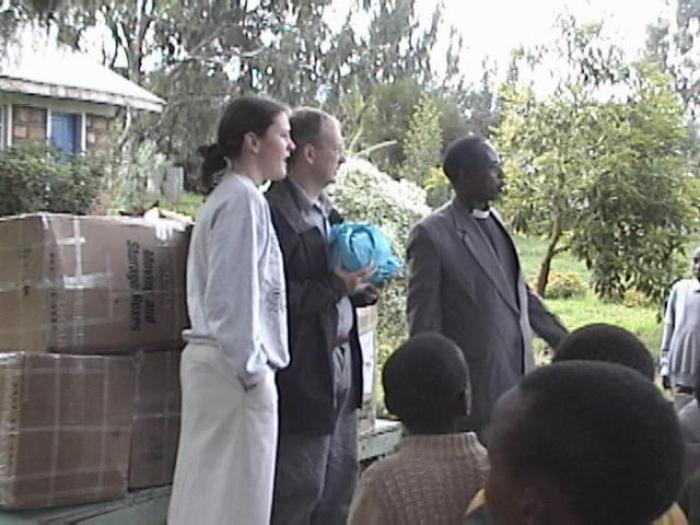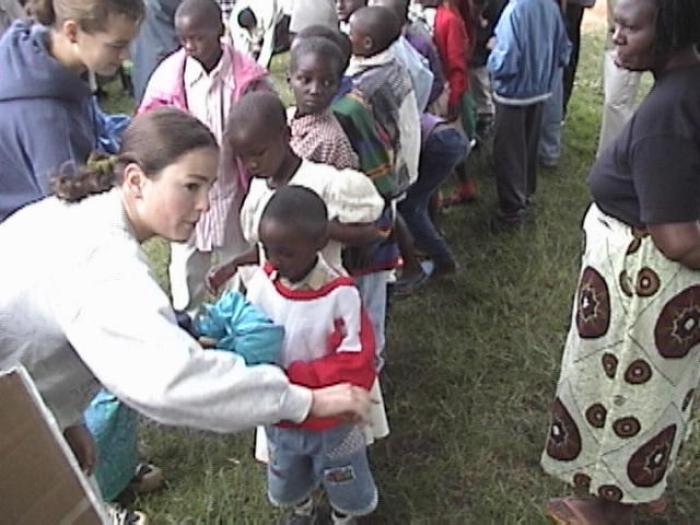It’s hard to be a Nazi in a Chihuahua t-shirt
Sometimes you just don’t know what to say, and it’s best not to say anything at all. Matthew was in a play in his class, and they were acting out a book they had read. When I asked him how his part went, he told me with great exasperation in his voice `It’s really hard to be a Nazi wearing a Chihuahua t-shirt.’
We are in a pretty regular water crisis here. Part of that is from the deforestation of Kenya; only 2% of Kenya still is forested, and that has caused droughts and irregular rains. Part of it is we live around people who have to walk miles to get water, and most of the water they get is untreated and full of amoebas. Part of it is that RVA depends on a borehole well that is twenty years old for most of it water.
We collect our shower water and use it to flush, and fill the diaper pail. The dorm boys collect the shower water and use it to mop floors. We time our showers and try not to go more than three minutes. But there is always more that can be done, so we had a meeting with the guys to discuss how we could save more water.
They were very enthusiastic, and had lots of wise suggestions. The one that really got them going was when we announced that it took almost five gallons of water to flush the toilets. You could see the gleam in their eyes when they said `we’ll go to the bathroom outside!!! You don’t need ANY water for that!!!”
Again, sometimes you just don’t know what to say, and it’s best not to say anything at all.
One of our purposes here is to help Kenyans see the value of replanting. When you make a dollar a day, I’m sure your first thought is not to say: `Hey, why don’t I buy some trees to plant?’ But there is some dedicated staff that has begun to grow seedlings, and there was going to be a huge tree-planting day with the community on Saturday
This was a week to get discouraged, and find new hope in unexpected places. We planted four thousand trees in the community on Saturday, and many students in nearby schools came to help. They were required to come in their uniforms, so the boys showed up in suits. When I asked one kids if that was uncomfortable, he told me it was the only set of clothing he owned.
As we climbed the hills to plant the seedlings, we kept running into people who were cutting the forest down. Although it is illegal, it didn’t seem to stop the hordes of folks who were destroying one of the last forests in Kenya. You had this little seedling in your hand, and you would see a huge tree being carried out, and the thought hit me `we are going to lose this battle.’
But then I saw Chuck Baker. Chuck is the shop teacher at RVA. He is in his sixties, and taught shop 40 years in the states. His wife died last year, and he decided to come out to be a volunteer. Just so you know about Chuck: he bought a house in southern California in 1969 that is probably worth a half a million dollars, and he has a nice pension. He could own a very nice home by the beach.
Instead, I saw him slip and fall twice as he maneuvered his way up the slippery slopes. I never heard him complain, and all he could do is talk about what a great day it was and what a privilege it was to be out there. And the thought hit me: `We’re going to win; we’ve got Chuck Baker on our side.’ I don’t know if you ever had the thought that you weren’t worthy to be around a person, but that is how I feel about Chuck.
Some friends back in the states sent $20 to us. They mailed it direct, never thinking that it would get stolen and try to clear their bank as a $2200.00 check. It was a reminder to remind you to never send checks directly to us, but it was discouraging.
Our older sons’ school in the states sent plastic sheets for the orphanage. Orphans tend to wet their beds frequently, and the result is soiled sheets. You can’t buy rubber sheets in Kenya, so it was a wonderful item for the school to have. But due to some miscommunication, they sent the items directly to the orphanage.
It meant that I would not be notified when it hit customs, and I could not receive the goods for the orphanage. The orphanage doesn’t have a phone, so we had to rely on the mail to get notice of where we could pick up the goods. By the time we received the notice, between customs and storage, our costs were going to be $1500.00, which is more than I make in a month.
So it went that the pastor, his friend and I journeyed to Nairobi in his 1974 Chevy pick up truck that was shaking so badly that I didn’t think we would get out of the parking lot. There were three of us in the front seat, and I sat in the middle. Because everything is a stick shift here, the driver had to reach between my legs to shift the car.
As we began the journey, with the car shaking and a man I had never met reaching between my legs at regular intervals to shift, we skidded and went close to going down a ravine. There were no seat belts in the car, and I realized I had the same thought I had had a month previously: I’m gonna die. But we had a wonderful time; it was my first venture in trying to tell an aggie joke to a Kenyan, and I guess some things are universal. I got real laughs.
After a two-hour trip to Nairobi, I announced to customs I couldn’t pay what they were asking. I asked why bedding going to orphans would be charged customs. I’ve done lots of negotiations in the states and felt like I was fairly good at it, but I kept getting blank looks when I say `It’s all for orphans in your country!! Why are you preventing this? Why aren’t you encouraging this instead of fighting me on it?’ They finally reduced it after a very very long discussion. Then we went to the storage company, who wanted almost $1000 dollars for storage.
We waited an hour, and then were told that no one could help us today, but if we came back on Monday, I could be helped, but the price would go up if we waited. After a long, long discussion, they said they would hold the price until Monday.
I spent the next week on the phone with the company. We talked over a dozen times, and after awhile, my great gifting in life won the day. They were so sick of talking to me that they agreed to reduce the price.
The pastor of the orphanage went back to town on Friday. Customs informed him that they had never agreed to a lower price, and that he could be fined for being late. We paid it all, but it was discouraging, and I felt like lots of missionaries start to feel: `why do I bother?’
But we finally had the stuff, so we went to the orphanage to distribute it on Sunday. Instead of just having a box of plastic/rubber sheets, they had a package for each kid. There was a blue floppy hat (so cool that all the seniors from RVA wanted one) a tennis ball (several kids asked me `why is there hair on this ball?’) a sucker, a toothbrush and some washcloths. The kids were so thrilled: you could here them exhale as they saw each new treasure. And the best treasure was that there was a personal card in each package; I couldn’t count the kids who said they had never had anyone write them a note before.
I was asked to say a few words by the pastor, and I got to say my favorite line: these were sent by people in America who love you.
Then I had to explain about the sheets. It was the first time in my life I’ve had a translator, and I’m sure he was grateful to have studied English as he translated:
These are your new sheets! If you pick them and make holes, I will come back and stand on your head. And then I will jump up and down!!! (As I demonstrated by jumping up and down, the 60-year-old pastor, who was translating, jumped up and down also)
It occurred to me that as discouraging as the customs charges were, the obvious work and care that went into those packages and the joy that the children had receiving them made me feel encouraged and grateful:
I’m on the winning side. I’m no Chuck Baker, and I didn’t spend hours putting all these packages together and raising monies for the sheets, but I’d be proud to warm the bench for the people that did.
Steve Peifer

At the orphanage

At the orphanage
